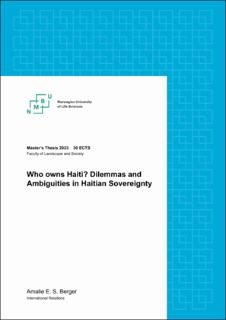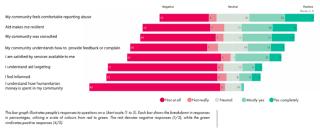| dc.description.abstract | This thesis uses a historical lens to examine events related to dependency, colonialism, and sovereignty in order to answer the question “Is the international community responsible for Haiti's “failure” as a state?”.
Since the Slave Revolution of 1804, Haiti has never been free from international interference. There is a long history of other countries and actors meddling in politics, economy, culture, and society, and there are numerous cases of international interference, involvement, and occupation whose effects are still present in Haitian society today. I use Haiti as the case in a case study to provide contextual examples and proof of why the International Community is responsible for how Haiti has become. I go through theories of development, international relations, failed state, and sovereignty, as well as look at how sovereignty is being contested by numerous actors in Haiti. From there comes a debate about ownership and international exclusion.
The aim of the thesis is to provide a solid and thorough explanation as to why international interference has been detrimental to Haitian society, and how it became as bad as it is today. | |

